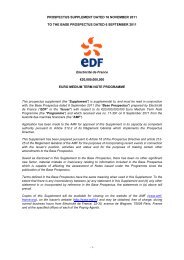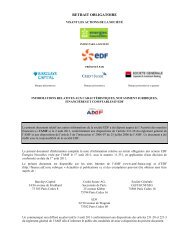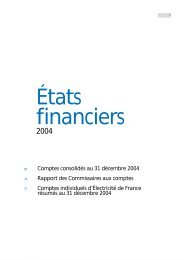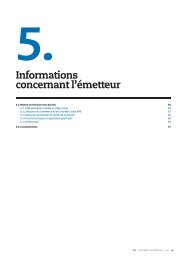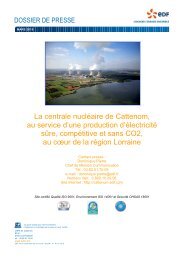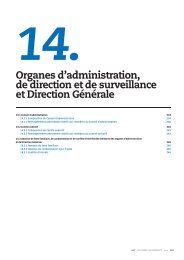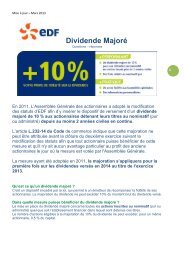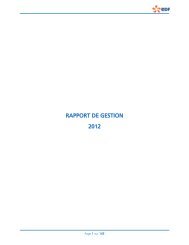Under the Euro Medium Term Note Programme ... - Finance - EDF
Under the Euro Medium Term Note Programme ... - Finance - EDF
Under the Euro Medium Term Note Programme ... - Finance - EDF
Create successful ePaper yourself
Turn your PDF publications into a flip-book with our unique Google optimized e-Paper software.
Risk Factors<br />
The <strong>EDF</strong> Group must comply with increasingly restrictive environmental and public<br />
health regulations, which generate costs and are sources of potential liability<br />
The <strong>EDF</strong> Group’s activities are subject to environmental protection and public health<br />
regulations, which are increasingly numerous and restrictive. These regulations relate to <strong>the</strong><br />
<strong>EDF</strong> Group’s energy generation, transmission and distribution industrial activities, as well as<br />
to energy supply and energy-related services, which must, for example, incorporate <strong>the</strong><br />
concept of demand management in <strong>the</strong>ir offers. Failure to comply with <strong>the</strong>se regulations<br />
could expose <strong>the</strong> <strong>EDF</strong> Group to significant litigation. The <strong>EDF</strong> Group could be found liable,<br />
even if it is not at fault or has not breached applicable regulations. Fur<strong>the</strong>rmore, <strong>the</strong> <strong>EDF</strong><br />
Group may be compelled to compensate breaches, damage or injuries caused by entities<br />
that were not part of <strong>the</strong> <strong>EDF</strong> Group at <strong>the</strong> time <strong>the</strong>y were committed, if <strong>the</strong> <strong>EDF</strong> Group<br />
<strong>the</strong>reafter takes over <strong>the</strong>ir facilities.<br />
Fur<strong>the</strong>rmore, <strong>the</strong>se regulations may be significantly reinforced by <strong>the</strong> national or <strong>Euro</strong>pean<br />
authorities, which would have a negative impact on <strong>the</strong> <strong>EDF</strong> Group’s activities and financial<br />
results.<br />
Current regulations, and future changes to such regulations, have resulted and are likely to<br />
continue to result in an increasing level of operating costs and investments in order to<br />
comply with such regulations. The <strong>EDF</strong> Group may even be required to close facilities that<br />
cannot be made compliant with new regulations. In addition, o<strong>the</strong>r regulations, which may be<br />
more restrictive or which may apply to new areas which are not currently foreseeable, may<br />
be adopted by <strong>the</strong> competent authorities and have a similar effect.<br />
In addition, stakeholders’ external perception of <strong>the</strong> <strong>EDF</strong> Group’s sustainable development<br />
policy may change, resulting in a deterioration of <strong>the</strong> <strong>EDF</strong> Group’s non-financial rating and<br />
image.<br />
Changes to regulations concerning energy savings certificates (ESC) could impose<br />
additional obligations on <strong>EDF</strong> and generate costs in relation <strong>the</strong>reto<br />
The energy savings certificates (ESC) measure, which was created by <strong>Programme</strong> law nº<br />
2005-781 of 13 July 2005 setting energy policy guidelines (POPE Act) and its implementing<br />
decrees, as amended by <strong>the</strong> Grenelle 2 law of 12 July 2010, and which is now codified as<br />
Articles L. 221-1 et seq. of <strong>the</strong> French Energy Code, imposes energy savings obligations on<br />
energy suppliers.<br />
In accordance with <strong>the</strong> conditions and procedures specified in <strong>the</strong> regulations, three-year<br />
energy savings objectives were established and allocated among persons subject to <strong>the</strong><br />
obligation to achieve energy savings (<strong>the</strong> “obligors”) on <strong>the</strong> basis of <strong>the</strong>ir sales volumes. This<br />
objective was 54 cumulative discounted TWh for <strong>the</strong> first period between 1 July 2006 and 30<br />
June 2009. The second period covers 1 January 2011 to 31 December 2013 and <strong>the</strong><br />
objective is 345 cumulative discounted TWh. Subject to financial penalties, payment of which<br />
discharges liability, by <strong>the</strong> end of <strong>the</strong> relevant period, obligors must produce energy savings<br />
certificates corresponding to <strong>the</strong>ir obligation, which are obtained in exchange for directly or<br />
indirectly carrying out energy savings actions, or which may be purchased from o<strong>the</strong>r socalled<br />
“eligible” economic entities through <strong>the</strong> national certificates register.<br />
-44 -



